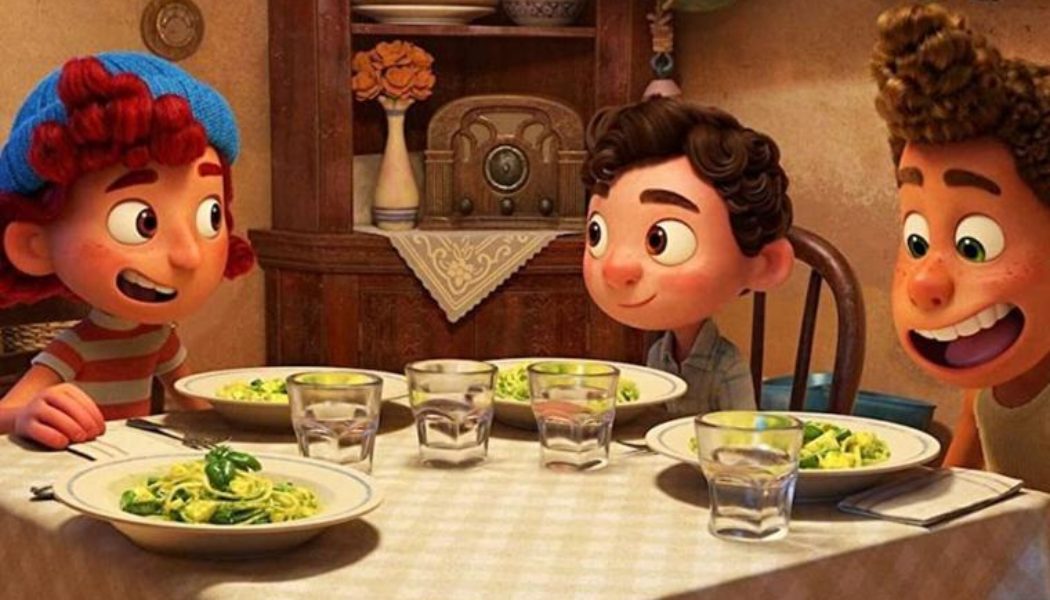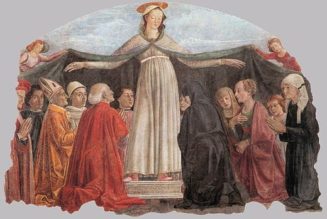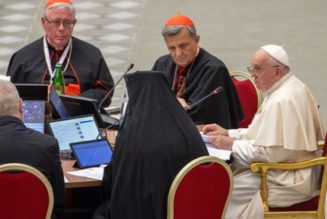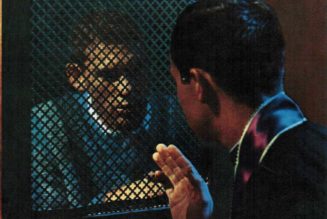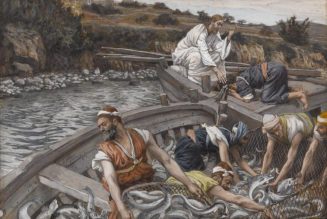
In Pixar’s Luca, a gentle, overtly Miyazaki-esque coming-of-age period piece struggles under the heavy weight of iron-clad Disney/Pixar formula requirements and story beats. The charming elements work well enough to carry the film, but only just.
The premise of two young sea monsters living just off the coast taking on human form and venturing into the human world for a summer of discovery and adventure, including befriending a human child about their age, while agitated sea-parents search for them, obviously recalls Hayao Miyazaki’s Ponyo, only with twice the sea-children and twice the agitated parents. (That Ponyo was Miyazaki’s riff on Disney’s The Little Mermaid makes Luca’s echoes of the earlier Disney film — one of the sea-children collects human artifacts, and there’s some perplexity about forks — a little on the nose.)
The milieu, a small mid-20th century town on the Italian Riviera, isn’t so far removed from that of Miyazaki’s Porco Rosso, which was set in and around the Adriatic, including Italy, during the Great Depression. (In homage to Porco Rosso, the coastal town in Luca is named Portorosso, and vistas of puffy clouds floating in immense blue skies and crumbling stucco over ancient stonework are evocative of the Japanese master’s work.)
If Miyazaki were to tell such a story with two boy sea-children and a human girl, probably the protagonist would be the human, since, unlike Pixar, the Studio Ghibli co-founder has always gravitated toward female leads. The Pixar film focuses on timorous Luca (Jacob Tremblay), whose relationship with brash, older Alberto (Jack Dylan Grazer) is a bit reminiscent of Onward’s meek Tom Holland and overbearing Chris Pratt as elven brothers — though the addition of a strong-willed human girl, Giulia (Emma Berman), mixes up things considerably.
While the production notes for Luca promise “an unforgettable summer filled with gelato, pasta and endless scooter rides,” which actually sounds like a Miyazakian idyll, the reality is less, well, idyllic.
Our heroes are barely allowed to enjoy a gulp of gelato (the word itself is never even spoken). There’s pasta, but mostly in connection with (I swear I’m not making this up) a competitive-eating leg in a local triathlon, the Portorosso Cup, which dominates the plot. And the brief scooter rides are nearly all one kind or another of make-believe.
Crucially, Miyazaki would have depicted a world in which humans, whether generally aware of the existence of sea monsters or not, would at any rate see nothing alarming or upsetting about their existence, and would probably be at most pleasantly surprised to run into one on the street or to hear that their child had encountered one. (See especially Kiki’s Delivery Service and My Neighbor Totoro as well as Ponyo.)
By contrast, alas, Disney/Pixar can’t help casting the relationship between humans and sea monsters as one of mutual fear, hatred and mistrust, turning Luca into (groan) yet another parable of intolerance, giving way in the end, of course, to enlightened acceptance. (See, e.g., Zootopia, Frozen II, and Raya and the Last Dragon.)
How intolerant? Welcome to Portorosso, the town obsessed with killing sea monsters, should they exist.
Most exasperatingly of all, Luca offers yet another rehash of that most moribund of family-film chestnuts, a Junior Knows Best tale of narrow-minded parents with irrational rules and salutary youthful rebellion leading eventually to parental and social enlightenment.
For all their professed veneration for Studio Ghibli, has no one at Disney/Pixar noticed how often Miyazaki and his colleagues surround the young protagonists of coming-of-age stories with enlightened, competent parents and mentors from whom the (often callow) lead characters typically have a lot to learn?
There are exceptions, of course, most strikingly Chihiro’s insensitive, venal parents in Spirited Away. But the pattern is unmistakable, from the protagonists’ wise, grounded fathers in My Neighbor Totoro and Arrietty to Kiki’s sweet parents and supportive mentors Osono and Ursula (Kiki’s Delivery Service) and Sosuke and Ponyo’s formidable mothers (Ponyo).
Happily, Luca does have a winsome if gruff parental figure, Giulia’s father, the aptly named Massimo Marcovaldo (Marco Barricelli). With his barrel-like build, thick mustache and heavy eyebrows, he strikingly resembles the father in first-time feature director Enrico Casarosa’s delightful short La Luna.
Massimo is a fisherman, and his taciturn manner, missing right arm, and alarming facility with knives and cleavers are understandably intimidating to Luca and Alberto, who are sure he would slice them into antipasti if he knew their true nature. (Since, like Darryl Hannah in Splash, the boys’ true nature is revealed any time they get wet, this is an ever-present danger.)
Once he cracks a joke about his missing arm, though, it begins to appear that Massimo is a decent sort. (In a small but significant departure from Disney convention, Giulia’s mother, though absent from Portorosso, is not dead. She and Massimo are presumably divorced or perhaps were never married, and, from fleeting mentions by Giulia — and mid-credits artwork — we learn that, in between summers with her father in Portorosso, Giulia spends the school year in Genoa with her mother.)
Luca’s parents, excitable Daniela and distracted Lorenzo (Maya Rudoph and Jim Gaffigan), are saved from sternness mainly by silliness and genuine affection for their son. Once they venture onto land in pursuit of Luca, it’s clear that they’re just as naive about the surface world as he is — which makes you wonder where savvy, jaded Grandma (Sandy Martin), who appears to know her way around the human world and supports Luca’s rebellious outings, went wrong raising her own brood.
Luca’s most compelling element is the shifting relationships among the three young leads. At first Luca is much awed by the older, more experienced Alberto’s air of worldly wisdom, and he is swept up into Alberto’s dream of owning a Vespa and traveling the world. In pursuit of their goal, both boys latch onto Giulia, who clearly knows more about life in Portorosso and things like money than they do.
As Luca’s curiosity and willingness to learn opens him to wider horizons, though, he begins to surpass Alberto — and the older boy, threatened by the erosion of his dominance in their relationship, lashes out at Giulia, the main source of Luca’s newfound insights into arcane topics like astronomy and telescopes. The more the film explores the volatility of young friendship, the better it is.
Alberto, who is the kind of boy who will make up answers if he doesn’t have them (he claims stars are fish, a conceit leading to a La Luna-esque dream sequence), doesn’t take kindly to Luca challenging his wisdom. In passing, why is the world of the sea apparently so much more parochial and benighted than the land? Luca becomes taken with the idea of attending school with Giulia; are there no schools for sea monsters? No sea-monster scientists? Do Luca’s parents think stars are fish, too? Do they not have money under the sea?
I like Alberto’s idea of personifying the voice in your head that tells you you’re not good enough and you can’t do it. He calls it “Bruno,” and “Silencio, Bruno” becomes the film’s inspirational catchphrase, typically spoken just before attempting something ambitious, even foolhardy. I wonder how many bruises and broken bones will be incurred in the next decade in the wake of those words being spoken.
Perhaps they could have renamed Bruno “Ercole,” after the preening local bully (Italian comedian Saverio Raimondo) who is Giulia’s archenemy, partly because he always wins the Portorosso Cup. The need for a bad guy — someone to be defeated in the end — is another Disney/Pixar crutch that probably wouldn’t have appeared in a hypothetical Miyazaki version of this story.
It seems to be de rigueur for all reviews of Luca to mention that any perceptions, based on early marketing, that Luca and Alberto’s relationship was in any way suggestive of an adolescent Call Me By Your Name are misguided. Casarosa has insisted that Luca is a story about pre-pubescent friendship uncomplicated by sexuality, and the film bears him out. To borrow a metaphor from the chapter on friendship in C.S. Lewis’ The Four Loves, the three young heroes stand, as it were, side by side, their eyes on common interests (winning the Portorosso Cup, buying a Vespa, astronomy, etc.), rather than facing one another, the pose characteristic of eros.
That doesn’t mean that, subtexually, the idea of sea monsters going anonymously among us out of fear of hatred and persecution if their true nature were known, and ultimately being accepted by open-minded people, doesn’t lend itself to a gay-friendly symbolic reading. It could also, of course, be applied to other modes of marginalized differentness. (For example, the fact that Luca’s whole family is “different” invites readings based on nationality, ethnicity, culture or religion.)
Speaking of religion, there’s a biretta-wearing priest in the background (TV chef Gino D’Acampo), but he’s almost irrelevant. Other than a brief exchange with Luca’s parents during the race about helping to hydrate the racers, his sole function, at the denouement — spoiler alert, obviously — is to faint dead away upon realizing that two locals he presumably knows well have been sea monsters all along. I guess I should be glad the priest isn’t positioned ignorantly preaching hatred of sea monsters.
In the end, when Alberto tells Giulia he can’t wait to race with her again next summer, she replies, “Or we could just have fun!” I would like to see the movie about that summer, if the filmmakers could really make a movie about characters just having fun.
Caveat Spectator: Brief bullying violence; pretend profanity and crass language (“Santa Gorgonzona!”; “Holy carp!”; etc.). Kids and up.
Join Our Telegram Group : Salvation & Prosperity
